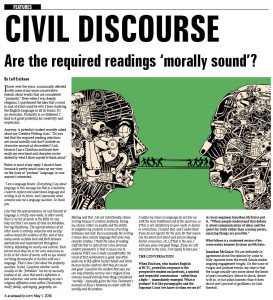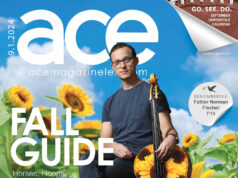By Leif Erickson
“Under certain circumstances, urgent circumstances, desperate circumstances, profanity provides a relief denied even to prayer.” – Mark Twain
I have, over the years, occasionally debated with some of my more conservative friends about words that are considered “profanity.” Even when I was deeply religious, I questioned the idea that a word in and of itself could be evil. I love studying the English language in all its forms; it’s an obsession. Profanity is no different. I find in it great potential for creativity and expression.
Anyway. A potential student recently asked about my Creative Writing class, “Do you feel that the required reading selections are sound morally and don’t include an obsessive amount of obscenities? I ask because I am a Christian and know how easily my own heart and character can be dirtied by what I allow myself to think about.”
Below is most of my reply. I share it here because it pretty much sums up my view on the issue of “profane” language, in case anyone’s interested.
 “I am a language fanatic. Everything I say about language in this message has that as a backdrop. I want to explore and understand language and writing in all its forms, and I appreciate when someone asks me a language question. So thank you.
“I am a language fanatic. Everything I say about language in this message has that as a backdrop. I want to explore and understand language and writing in all its forms, and I appreciate when someone asks me a language question. So thank you.
I feel that the appropriateness (or lack thereof) of language is strictly man-made; in other words, there is no list of words in the Bible (or any holy text that I am aware of) that are forbidden, barring blasphemy. The appropriateness of all other words is entirely subjective and society/culture-based (for evidence of this, look at how many words oscillate back and forth between appropriate and inappropriate throughout history, depending on society and culture). Each person must obey his or her own conscience as to his or her choice of words, with an eye toward not being disrespectful or hurtful with one’s language. That is how I feel about the profanity question. In fact, I question whether words usually on the “forbidden” list are by necessity profane at all, since that word’s definition is also subjective, and varies depending on one’s religious affiliation (even within Christianity itself), family, upbringing, geography, etc.
Having said that, I do not intentionally choose writing because it contains profanity, basing my choices rather on quality and the ability to enlighten my students in terms of writing technique and skill. But occasionally the writing I choose does contain language that some may consider profane. I think the value of reading stuff like that in spite of one’s own personal comfort parameters is that it causes one to examine WHY one is made uncomfortable; the result of that examination is good, and often leads one to RE-affirm his/her beliefs and limits because he/she confirms that they are sound and good. I question the wisdom that says one can only properly exercise one’s religion if one removes oneself entirely from things considered “worldly,” especially given the New Testament’s accounts of Jesus’s tendency to confer with the worldly and the profane.
I realize my views on language do not line up with the more traditional end of the spectrum, so if this is not satisfactory to your needs or desires or convictions, I respect that, and I understand if you do not register for the class for that reason (see the above part about each person obeying his/her conscience, etc.). If that is the case, I wish you peace and good things. If you are still interested in the class, I am happy to have you.”
THE CONVERSATION
When Erickson, who teaches English at BCTC, posted his response to the prospective student on facebook, a spirited and respectful conversation — rather than a fight — immediately emerged. What is profane? Is it like pornography and the Supreme Court (we know it when we see it)?
As local engineer Jonathan McGuire put it, “When people understand that debate is about communication of ideas and the quest for truth rather than scoring point, amazing things are possible.”
What follows is a condensed version of the conversation between Erickson and McGuire.
Jonathan McGuire: We are definitely in agreement about the opinion by some to fully separate from the world (kinda makes ongoing engagement tough). On the issue of vulgar and profane words, my take is that the usage usually says more about the limits of one’s vocabulary, desire to shock, desire to fit in, or just plain laziness than it does about one’s pursuit of godliness (or lack thereof).
Education, if it is actually going to be education, needs to focus on excellence, not the acceptance of mediocrity (that’s the cultural default…no need to attend school to get that). But in the pursuit of this excellence, there needs to be an exposure to the history of English literature (and Western Civilization in general) so that a student can have a proper context for his or her own culture…and there is no small amount of difficult topics (and words) here.
Leif Erickson: I do not accept the premise that the use of profanity by default reveals a limited vocabulary (in fact, accumulating profane words in one’s quiver of available expression represents, literally, an expansion of one’s vocabulary; and the ability to weave profanity in original and interesting ways demonstrates creative ability). I also do not accept that the use of profanity indicates laziness (which I too despise in language usage), and I think for mainstream America, profanity is no longer shocking in most cases.
I think the things you mention (laziness, conformity, empty shock, limited vocabulary) are not limited to “profane” words, but plague modern language usage generally. It happens that some people who traffic in those bad linguistic habits also happen to use profanity, but that is usually an accidental correlation, at least in my experience.
I can accept the idea that there is some value to having kids be as respectful of everyone’s belief systems as possible in a setting where everyone is required to be (i.e. compulsory education). People cannot simply stop coming to school because they don’t want to hear such words that they have been taught are bad, so I think it is common courtesy to keep the language as neutral as possible when it doesn’t interfere with learning and the exploration of ideas unnecessarily. So in short, I am glad I don’t have to make such decisions, because philosophically I would have a hard time banning any word (depending on the context, of course, and the potential for harm), but I also would want no one to feel marginalized or oppressed. The Victorian era put a gag in the mouth of colorful language that we still haven’t managed to spit out, and this must be taken into consideration.
JM: This is how I tend to hear vulgar and profane language (not always, but mostly). Hearing someone with a large vulgar or profane vocabulary doesn’t offend me per se (context is important). But I tend to view them, in the moment, in much the same way that I view young men who go out in public with their pants sagging below their undies, young women who appear to shop at “Hoochie Mammas R Us,” or any adult who is shopping at Walmart wearing wrong sided pajamas in the middle of the day.
It may indeed be the case that “Sag Boy” or “Hoochie Mama” are highly educated and important contributors to the economy. But when they go out in public like that, they’re making a statement about how much they care and how they are going to be received. In other words, their attire is more likely to be limiting for them.
Use of language is very similar. Being creative in the use of vulgar or profane language is just not the wisest cultural move. Dumbing down rarely is.
“People cannot simply stop coming to school because they don’t want to hear such words that they have been taught are bad…?” Sure they can. And many parents make this decision. More importantly, a great many private employers make similar decisions regarding hiring.
I would not want to make vulgar or profane talk illegal. But there is an opportunity cost to one’s word choice.
LE: I did not account for home schooling, it is true. I see situations arising from differing worldviews as one of the (many) unintended sticky consequences of compulsory schooling, as well-meaning as it is. But that is a topic for another conversation.
Also, I think you are not giving enough credit to how people’s perceptions have changed/are changing in regards to profanity and its acceptability. I say it is a welcome change and cannot come fast enough. As I said above, I think the Victorian era did a lot of this, and a pox on them. But yes, there are still many situations where expediency means voluntarily censoring oneself.
There are many words it would have been perfectly acceptable to utter in school 50 years ago that would never be considered appropriate now, and by the same token, many words and phrases that one can say now without consequence that would have led to keelhauling during that same area. I think that tells us something about the cultural nature of such rules, and while I don’t say those rules are valueless, I do say that we should hold loosely to them and accept when they change.
JM: The expression of one’s thoughts is always going to exist in a dynamic. Method and approach will always flavor the perception of the thoughts themselves. For example, there is a way to express one’s view of a current cultural issue like “gay marriage” from the more conservative biblical position without being offensive…but there is a way to express this same viewpoint where it appears that the intent is to be as offensive as possible. The latter almost guarantees that the viewpoint is not going to be engaged.
A great many of the words that are no longer appropriate in school (or in a professional environment) are so because of the inherent racial, sexual, and religious bigotry that accompanied them. They were words used to hurt, marginalize, de-legitimize. They were anti-productive words.
Perceptions do change. Part of the opportunity cost of attempting to be on the vanguard of acceptable language can be the choice of full language freedom versus paycheck or promotion or freedom in another sphere.
I don’t see a substantive meaning in that particular sacrifice.
By way of clarification: there is also a way to oppose vulgar and profane speech that is just as divisive and wrong headed as the speech being opposed. Many of us have a significant capacity to use any and every situation as a way of elevating self over others. This trait, in my opinion, is worse than that expressed by one who is…um…quite creative with word choice.
LE: I think there is an opportunity cost associated with any social tradition, and a shrewd, wise person always has to take that into consideration. For instance, I have no patience for the tradition that says men should take off their hats indoors. Silly. Yet, if I have a meeting with my boss, and I know she subscribes to that silly tradition, I will take my hat off. This says nothing about the inherent nature of hat-wearing, though. And this is the logic I see a lot of people use toward language: that the social barnacles attached to words somehow inform us of their inherent moral quality, and I strenuously disagree. It’s kind of an existential guilt by association thing. I view it as a tactic (intentional or otherwise) for people to justify a deep-seated conviction, as airy and substantial as cotton candy, that certain words are just bad, no matter what. I also find it curious how convinced such people are of the validity of THEIR list of pet naughty words.
JM: To some, it has a Scriptural basis (Philippians 4:8, Matthew 15:18, etc…).
LE: If only the scriptures had been more specific. ‘Twould be convenient for the devout to have a list to consult. One thing that used to frustrate me when I was religious was the way some people used those scriptures by layering their own list of words over those scriptures and thus piggybacking on them to saddle their own hobby-horse. (Sorry for the mixed metaphors— but at least no one will call one a sinner for that.) I agree that some words are considered coarse, yes; but I maintain that this list changes and fluctuates.
JM: I referenced the Scriptures because of that particular basis that many use to determine appropriate speech.
I share your experience with folks who read passages like these through their own preferences. But this is not significantly different than those who would prefer that culture change to allow for personal preference in language.
What, indeed, are the standards and who gets to set them? The thing about rules is that some of them increase freedom and others restrict it.
We should, then, be diligent about where we push for flexibility.
LE: With rare exceptions, the history of language development shows us that usage alone changes the norm. Attempts to legislate or enforce usage to match someone’s idea of what should be (or some group’s idea of same) are almost always the errands of fools, and when it does “work,” it almost always backfires in some interesting way that just re-asserts language’s inherent neutrality and lack of predictability. So the individual’s (or the group’s, or the government’s) push for flexibility (or rigidity, for that matter) is irrelevant. I simply love how all of that works, and I admittedly usually celebrate when the tide of usage frees another word from the taboo pile.
JM: What also happens is that language develops along multiple paths within cultures and often becomes part of the identity of each subculture.
Word choice, the celebration (or frowning upon) of the crude or base, accents all help to identify the user, fairly or not.
Unintended consequences have always accompanied the work to “free up” a culture to embrace the more crude, vulgar, profane.
Attempting to legislate against such changes (or consequences of pushing the changes) is foolish. The market tends to punish and reward pretty well on its own.
————————————————
Leif Erickson teaches English at BCTC. You can find his recent work in Kentucky Monthly and Flashpoint Magazine.
Jonathan McGuire is a Christian, husband, father, engineer, long time resident of Lexington, lover of language. He says, “When people understand that debate is about communication of ideas and the quest for truth rather than scoring point, amazing things are possible.”








